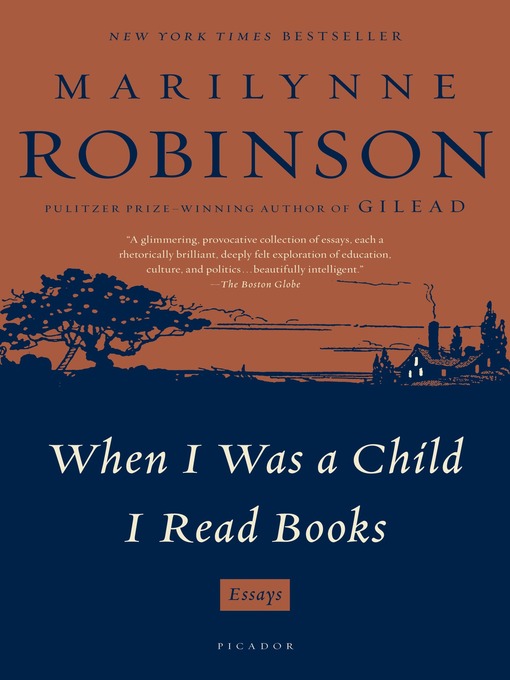
When I Was a Child I Read Books
Essays
کتاب های مرتبط
- اطلاعات
- نقد و بررسی
- دیدگاه کاربران
نقد و بررسی

Starred review from December 19, 2011
Author of the Pulitzer Prize–winning novel Gilead, Robinson weighs in with a series of tightly developed essays, some personal but mostly more general, on the Big Themes: social fragmentation in modern America, human frailty, faith. Her project is a hard-edged liberalism, sustained by a Calvinist ethic of generosity. Among her contemporary intellectual models are theologians such as John Shelby Spong and Jack Miles. From earlier times, she invokes Moses, Jesus, Calvin, Emerson, Johann Friedrich Oberlin (who figures indirectly in Gilead), Poe, Whitman, and others. In these times of the ever-ascending religious right, in the aftermath of what she sees as the ideologically secularist-driven cold war, Robinson bravely explores the corrosive potion of “Christian anti-Judaism” and what it really ought to mean to be “a Christian nation.” The closing essay is about the twin establishmentarianism straitjackets of Freudianism and Darwinism in the collective presumptions regarding the supremacy of self-interest—ill-informed fundamentalist nostalgias being one clear sign—which, she says ruefully, have supplanted true religious discourse. Agent: Ellen Levine, Trident Media Group.

December 15, 2011
The Pulitzer Prize–winning novelist returns with a collection of essays that are variously literary, political and religious. Robinson (Iowa Writers' Workshop; Home, 2008, etc.) begins with some quotations from Whitman about democracy, then blasts the contentious, mean-spirited political climate. Although she discusses writers, her reading and her life, one subject colors her pages with passion: religion. Although she establishes early (and often) her political liberalism, she is an unashamed Christian, an intellectual who proudly asserts her credentials of faith and defends her beliefs against both the crudities of contemporary culture and the assaults of the popular atheists (Dawkins, Hitchens et al.). Although she tries hard to keep a balanced view (she admits the cruelties of Christians over the centuries; she acknowledges the claims of other faiths and the truths of science), she returns again and again to her belief in the wisdom of the scriptures--and defends most thoroughly the Old Testament and its God. She argues that the Old Testament has had a bad rap lately, with critics of all sorts alluding to its vengeful, sanguinary deity. So Robinson offers a counterbalance, pointing to Mosaic laws that show compassion for the impoverished and the otherwise weak; she quotes chapter and verse to support her view--though she surely realizes (better than most writers) that one may also visit Leviticus and find verses that present a much harsher picture. Robinson is a splendid writer, no question--erudite, often wise and slyly humorous (there is a clever allusion to the birther nonsense in a passage about Noah Webster). Articulate and learned descriptions and defenses of the author's Christian faith.
(COPYRIGHT (2011) KIRKUS REVIEWS/NIELSEN BUSINESS MEDIA, INC. ALL RIGHTS RESERVED.)

October 15, 2011
Few and far between, Pulitzer Prize winner Robinson's novels are immensely appreciated when they arrive, and so are her essay collections. Here she revisits favorite themes, from the role of faith to the complexities of human nature. For all your smart readers.
Copyright 2011 Library Journal, LLC Used with permission.

Starred review from January 1, 2012
There is more food for thought in one of Robinson's well-turned paragraphs than in entire books. Esteemed for her award-winning novels Gilead (2004) and Home (2008), Robinson is a consummate and clarion essayist. In her third and most resounding collection, she addresses our toxic culture of diminishment, arguing that as our view of society shrinks, public discourse coarsens, corruption spreads, education is undermined, science denigrated, spirituality and loving kindness are siphoned from religion, and democracy itself is imperiled. What has made America great, she reminds us, is our heroic focus on and investment in the public good. In the brilliantly corrective Austerity as Ideology, Robinson looks back to her Cold War childhood, during which America's response to crisis was to ramp up our commitment to art and science. Now she fears that our obsession with market economics is putting us in danger of losing the ethos that has sustained what is most to be valued in our civilization as public schools, universities, libraries, and the free press come under siege. In Imagination and Community, Robinson lucidly and movingly explains how the imagination is the wellspring of healthy communities, and how profoundly reading enhances our capacity for sympathy. Intellectually sophisticated, beautifully reasoned with gravitas and grace, Robinson's call to reclaim humaneness beams like the sun breaking through smothering clouds. HIGH-DEMAND BACKSTORY: The great success of Robinson's novels will ensure interest in her brilliant reflections on the most urgent questions of our lives.(Reprinted with permission of Booklist, copyright 2012, American Library Association.)

























دیدگاه کاربران